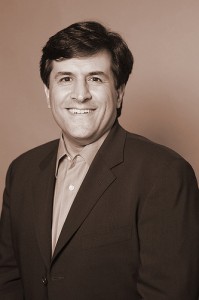 Tablets, particularly Apple's iconic iPad, are hot topics in healthcare right now. But that doesn't mean that the iPad, or even the general idea of a touch-screen tablet, is right for everyone.
Tablets, particularly Apple's iconic iPad, are hot topics in healthcare right now. But that doesn't mean that the iPad, or even the general idea of a touch-screen tablet, is right for everyone.
"All of it is on a tablet, but the key is, the tablet is optional," Kian Saneii, CEO of San Diego-based Independa, says of his company's signature product, called "Angela," that helps manage the lives and care of elderly patients who choose to stay in their homes rather than move to assisted living or nursing homes. "You can use the telephone to do some pretty nifty, amazing things for that individual, very cost-effectively."
That includes robo-calls for reminders of life and health events, such as "This is your 10 a.m. reminder for your 11 a.m. pick-up to go to the doctor." Saneii says people love this, since they are getting reminder calls anyway, but it's not nagging the way they might feel if the call came from their kids, or elderly see themselves as a burden. The idea is to combat the social isolation that comes from living alone, which can lead to depression and other health issues and to help caregivers keep tabs on senior patients from a distance.
But technology more advanced than the telephone can enhance the experience for everyone involved. "The tablet really gives us a rich environment to do that," Saneii says.
Reminders come over the tablet, but the user can play games, stay in touch with friends and family via Facebook and take part in other Internet-enabled activities, even if they have limited computer skills. Tablets and similar touch-screen devices happen to be pretty simple to use, and are engaging.
"Simple is a part of engaging, but it has to be intuitive, it has to be fun, is has to be easy. It has to, from a management standpoint, not require you to know anything about computers, not require you to know anything about iTunes updates or Microsoft Tuesday updates or security issues or virus scans or phishing attacks," Saneii tells MobiHealthNews. "You are not in the business of managing a computer. You are in the business of having a social engagement portal to the world that changes your life and makes life better while you are looking to extend your independence."
Tablets can be powerful and easy to use, but may not be the best option for an elderly population. "What we're finding is that mobility is important, but not necessarily more important than having a larger screen," Saneii says. Sometimes, customers are opting for touch-screen PCs that stay in one place and don't need to be recharged. "For the elderly, it's logistically difficult to constantly manage that battery back-and-forth, plugging it and unplugging it."
Saneii reports that about half of Independa's customers access Angela from a fixed location. Portability is popular in palliative care and home care, though, since the healthcare provider sometimes wants patients to have a tablet at the bedside so it's readily available for quick conversations. "That's a very powerful function of being portable," according to Saneii.
Independa also bucks popular trends in that it has embraced Microsoft Windows for its tablets. The Independa tablet originally ran Google's Android operating system, but Saneii made the decision to switch to Windows after hearing at the Consumer Electronics Show last in January that there was too much demand for large screens. Android currently can't support screens bigger than 10 inches, and the 22-inch touch-screen PCs Independa already was getting from computer-maker Asus are Windows-based.
Independa tablets, made by a private Chinese manufacturer, now run Windows Phone 7, an operating system better suited for smartphones. Saneii says he is anxiously awaiting the release of Windows 8, which will have a tablet-specific version that promises to be leaner than the full-powered PC operating system, which hopefully will allow for better battery life and lighter tablets. Microsoft has said it would release Windows 8 at an unspecified time in 2012. (CEO Steve Ballmer is scheduled to keynote at CES 2012 in January, so there might be more news then.)
Sanaii says Independa really is agnostic when it comes to OS. "We're a software company. We can run on anything. It's just that right now, because Android doesn't scale to more than 10 inches, we are not on it," he says. The Independa chief would be fine with Android or Apple's iOS down the road if either of them could support larger devices.
Independa is not selling Angela in the tough direct-to-consumer market, but rather through channel partners including organizations involved in home health, assisted living and palliative care. "All of them align perfectly with the notion that if you keep someone home longer, safer and more comfortably, then you have a better business," Saneii says.
The company will have news on some new partners at next month's mHealth Summit outside Washington, D.C. Saneii isn't ready to offer specifics, but Independa is a founding member of the USC Center for Body Computing, so it's a safe bet that connectivity with home health devices is on the horizon.
What is known is that Saneii is sold on the idea of person-centric communication. "Connectivity is going to be almost a personal thing, where individuals might be their own hotspots not too long down the road," he predicts.
















